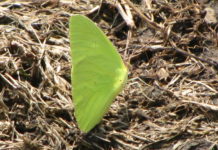Photo credit: DiasporaEngager (www.DiasporaEngager.com).
The Georgia Potato Program is working with agricultural businesses and smallholder farmers to catalyze quality seed production while aiding Georgia’s Science Research Center for Agriculture to develop an effective seed certification system. One groundbreaking achievement was the inauguration of a model seed farm in Akhaltsikhe, in southern Georgia, managed by the PPN and the private company Rural Advisory Service Ltd, with support from GFA and CIP. The farm is equipped with an in-vitro lab, two greenhouses, and 4.5 hectares of irrigated plots. The staff applies a mix of hydroponics, aeroponics and apical cuttings to produce disease-free foundation seed used to grow certified seed potatoes. The farm produced 22 tons of foundation seed in 2021, that its staff and 640 smallholder farmers – half of them women – used to grow commercial seed potatoes. The farm’s irrigated plots are expected to produce 150 tons of certified seed in 2022, with a market value of approximately USD 155,000.
To raise farmer awareness about the importance of quality seed, the Program coordinated 200 seed potato demonstration plots on small farms – 53 of them managed by women. Young farmers are also capitalizing on the opportunity. Twenty-five year old Giorgi Khitarishvili planted quality seed for the first time in 2021 and produced 33 tons per hectare – almost three times the national average yield!
Seeds of empowerment
Whereas the average size of Georgia’s male-headed farms is 1.3 ha, the average size of female-headed family farms is only 0.77 ha. To help women farmers overcome such disadvantages, the Potato Program helps a growing number of women to produce quality seed, which sells for higher prices than table potatoes.
In 2021, 11 women were trained in producing apical cuttings, used to grow disease-free seed potatoes. They became members of a Seed Potato Multiplier Unit, certified by the Science Research Center for Agriculture. Their goal is to produce two million rooted apical cuttings in 2022, which should be enough to provide 10,000 farmers with quality seed potatoes.
Khatuna Bolkvadze, a widowed mother of two young girls, explains that producing apical cuttings has provided her with needed income and alleviated the sorrow she felt since her husband passed away. “The moment I started working in the greenhouse, I felt a strong sense of responsibility, because I know I’m helping other farmers improve their production,” she explains.
Bolkvadze and hundreds of other women and men trained under the Program are helping build the foundation of a national potato seed sector with potential to transform the production and livelihoods of the Georgian farmers.
Source of original article: International Potato Center (cipotato.org).
The content of this article does not necessarily reflect the views or opinion of Global Diaspora News (www.GlobalDiasporaNews.com).
To submit your press release: (https://www.GlobalDiasporaNews.com/pr).
To advertise on Global Diaspora News: (www.GlobalDiasporaNews.com/ads).
Sign up to Global Diaspora News newsletter: (https://www.GlobalDiasporaNews.com/newsletter/) to start receiving updates and opportunities directly in your email inbox for free.

































